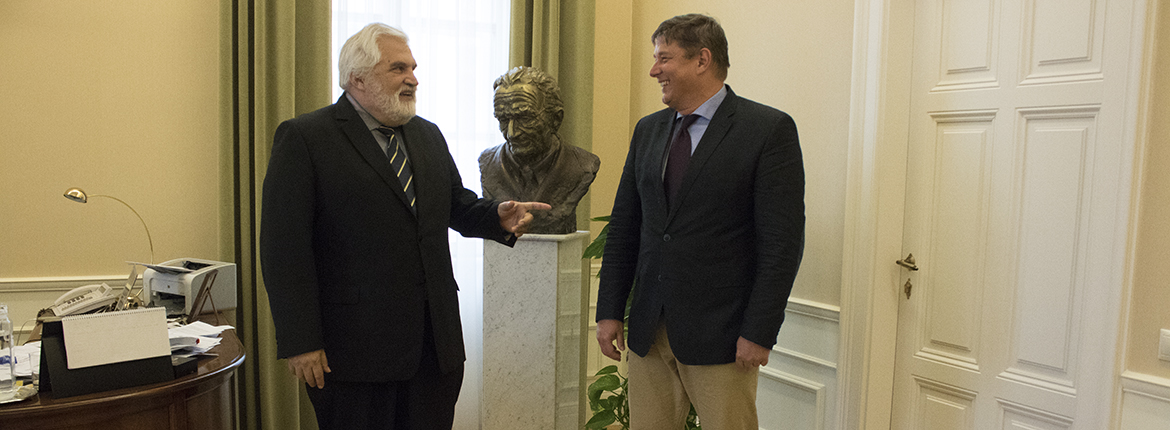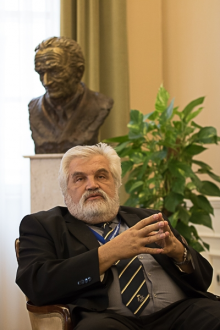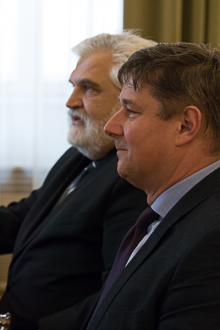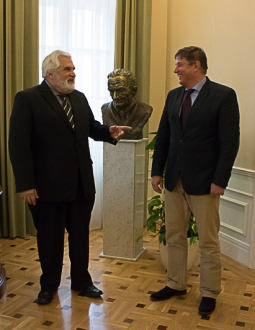
“There is no revolution.” “The changing of the guards is seamless.” This is the message conveyed by the fact that the resigning and prospective rectors of the University of Szeged have both participated at cabinet and senate meetings since the beginning of 2018, and that they appear together, as they did, for example, at the spring job fair and similar events, and that they jointly speak to the Chinese delegation. So it is only natural that the two professors, Gábor Szabó, who is performing the last weeks of his rector's assignment, and László Rovó, who is preparing for taking over the SZTE’s governorship, were asked for a joint interview by the University of Szeged Magazine, to account for the past and to look into the future before the turn on the 1st of July 2018.
“‘The budget of the University of Szeged is much larger than that of the city of Szeged. At the same time, management conditions have ‘wavered’ in the last 8 years. Working under these changing conditions, which results are proud of?”
 Prof. Dr. Gábor Szabó: “We have gone through some difficult periods that have inspired us to be modest about our goals. Thus, I consider it a success that the university community remained intact; the institute did not fall apart into a set of bickering faculties. Instead, there is an obvious sense of internal solidarity – at least in comparison with a good many partner institutions. It is another success that scientific cooperation between faculties has grown, multidisciplinary projects have been created that coincide with the goals of maintainers and with these antecedents we could join the New National Excellence Program. It was one of my main goals to keep the university's current financial problems from being felt by patients and students. This has not been easy, but we have succeeded. I find it important that our university's senate remained unified even in critical situations, so we could make those compromises that were necessary to reach today.”
Prof. Dr. Gábor Szabó: “We have gone through some difficult periods that have inspired us to be modest about our goals. Thus, I consider it a success that the university community remained intact; the institute did not fall apart into a set of bickering faculties. Instead, there is an obvious sense of internal solidarity – at least in comparison with a good many partner institutions. It is another success that scientific cooperation between faculties has grown, multidisciplinary projects have been created that coincide with the goals of maintainers and with these antecedents we could join the New National Excellence Program. It was one of my main goals to keep the university's current financial problems from being felt by patients and students. This has not been easy, but we have succeeded. I find it important that our university's senate remained unified even in critical situations, so we could make those compromises that were necessary to reach today.”
“What indicators do you assign for measuring your success in reaching your goals during the period starting in the summer of 2018?”
Prof. Dr. László Rovó: “I think that the most important indicator is to balance the university budget. Institutional management is based on a normative rate set by the state, paid according to the number of students, and the tuition fees paid by students. It is important that faculties develop their own strategic plans and designate resources, for example, in order to increase their student numbers by 10 percent in the near future. The key issue for state-funded universities is the degree of government support, so we must also take into consideration the fulfilment of indicators assigned to the achievement of the maintainer's goals. This is because government support is a resource for which we are competing with other universities. The rector needs to play a more active role, in order for every internal unit to feel that they work to balance the diversity of and develop the university, while demonstrating to the government that the goal of the SZTE is to develop from a regionally significant university into a leading European institution.”
“The introduction of the chancellery system has brought about a significant change in the operation of Hungarian higher education institutions. In your opinion what are the difficulties and benefits of this change?”
G. Sz.: ”The arrival of the chancellors was darkened by the fact that they decidedly came from the outside, so the university’s public and academic community watched their activities with suspicion. Maintaining this function is perfectly alright as long as the institutions are involved in the candidate’s appointment, as for example – as we have seen in the last period – the delegates of the Rectors' Conference were. This creates the conditions for cooperation. We have a balanced cooperation with the second Chancellor of the SZTE: we share all necessary information with each other; we often argue, but we always reach a compromise on matters important to the university. It is crucial to emphasize that in our case, a full chancellery was not formed; the directorates of the SZTE have become professional organizations, which respond to the requests of both the Chancellor and the Rector, and support their decisions with their professional work.”
L. R.: “The cooperation between the Rector and the current Chancellor of the SZTE can be regarded as extremely good, even at a national level. As a result, many overlaps disappeared, and significant development resources came to the university. Personally, I would like to pursue this direction. The University of Szeged is a complexly connected and complicated network system, which has to be led harmoniously by the Rector and the Chancellor. This also means that we should, for example, be able to support the plans of the academic sphere with economic calculations.”
“Success-oriented leaders are often heard to say ‘A team is needed!’”
 G. Sz.: “I'm proud of both my teams. I would like to thank the vice-rectors of both cycles for their work: they performed well, while they were also progressing professionally. I am also proud of the fact that women have been given opportunities like nowhere else at Hungarian universities.”
G. Sz.: “I'm proud of both my teams. I would like to thank the vice-rectors of both cycles for their work: they performed well, while they were also progressing professionally. I am also proud of the fact that women have been given opportunities like nowhere else at Hungarian universities.”
L.R.: “I believe that the main condition of effective rectorship is setting up an effective cabinet with strong members, but the conciliation process may take until the end of June. It is possible that I will ask someone to coordinate development tasks. We have started assessing the potential and structure of education, the teaching load and the competitiveness of faculties; I would like to investigate the research network to see which nodes are strong and which need to be strengthened.”
“What do you think are the three most important challenges the SZTE had to and will have to deal with during your rectorship?”
G. Sz.: “The biggest challenge, the difficulties of management, appeared at least three times during my two rector cycles. At the launch of the Széll Kálmán Plan, it unexpectedly withdrew funds from us; we had to protect ourselves from redundancy, which would have disrupted the operation of the institution. The negative balance in health financing was a protracted problem. We tried to eliminate the internal reasons for this, but we had no control over the external issues. In the meantime, we had to prepare for the ‘pleasant troubles’ of the past two years: to execute our successful applications.”
L.R.: “The solutions to previous problems have put the University of Szeged at a competitive disadvantage. The most urgent task is the economic consolidation of our single greatest expenditure, the clinical centre, because without solving that issue, the university's economy remains unstable. Considering the research and development potential of the SZTE, with clinical developments, the development of the Science Park around the ELI-ALPS research centre and the modernization of the faculty of Humanities and Arts, we have a good chance of meeting the 21th century’s challenges of university education, research and support of artistic activity.”
Service university – for students
The first universities in the Middle Ages were a community of teachers and students. How can a rector of a modern universitas rely on students and on the Students’ Union, which represents this community?
“As we were taken to court, it would be strange to say that our cooperation has been smooth, but I remember only the nice things,” looks back Gábor Szabó. “A modern university provides services –for the students as well. My own students can attest that we have changed our curricula based on their feedback… So I have a good relationship with students, I'm happy to work with them, and I consider them colleagues from their first semester. Passing on knowledge at university level is not a one-way process: the high-quality SZTE degree is the result of joint work by both student and professor. Talent management is a key issue, because that itself will attract students who have a thirst for knowledge and are ready to learn, in other words, the elite of this age group.”
“As I explained to the Students’ Union when I spoke to them as a rector candidate, one of the reasons the university exists is the students themselves,” László Rovó says, referring to his start. “Students' opinions and well-being are of utmost importance. Their memories of those 3-5-9 years spent here may have an impact on the future of the university too. We have to take into account the opinions of the student union when making decisions in areas of university operation that area student-oriented, while in other fields it is the interests of all that count.
I sincerely hope that if students also notice that they live in better dormitories, get better educational conditions, have higher scholarships and more sport facilities, then their union will turn away from its current politicization in a direction that focuses on the universitas.”

Their compass is ’the SZTE’s interest’
If you do what you love, then you never work… Both László Rovó, professor at the Department of Otorhinolaryngology, and Gábor Szabó, academic laser physicist, find this statement, attributed to Confucius, to be true. But what do their families think about the 10-12 hour-long work days? How does a professor, who is ready continue to pursue his profession as well as fulfil his duties as rector, re-charge their batteries? What is it that provides a compass in this forest of duties, tasks and hobbies?
“In addition to reviewing a legal complaint and the SZTE Innovation Week program, I also ‘secretly’ looked at the ethane spectrum this morning.” Gábor Szabó raises three pieces of paper from the towering stack on his desk at the rector’s office. “In my case the family's little ones have already flown the nest. Even the youngest of them has just turned 30 the other day. I thanked my wife even at my academic inauguration for maintaining the appearance with our children that they have a father for 25 years… I think if you want to reach something – it makes no difference whether you are a laser physicist or an oto-rhino-laryngologist – then you have to commit more to your work than an 8-hour working day,” opines Gábor Szabó. “I often tell my students: I have seen people work a lot and not achieve anything, but I have never seen anyone achieve great results without putting in the work. In my case re-charging my batteries when I am performing my duties as rector means spending time with Physics sometimes – with great pleasure, for this is my true calling as well as my hobby. I am planning to return to work on my academic research team from July 2018, as we work on important industrial projects, and I also have some plans for the renewal of education. I do not think I will spend less time working than I used to, but I do hope that there will be fewer trips back and forth. I would like to pursue my external tasks and assignments, for example the ones related to innovation.”
“So far I have tried to direct my career so that nobody in the family feels a sense of absence. I really love my work and I have put a lot into it: from organizing to advancing the careers of younger colleagues to leading the Society of Oto-Rhino- Laryngology. I have gotten used to the fact that working in science, research, management of clinics, surgery, and postgraduate education means a 10-12 hour business day,” recalls László Rovó. “Nearing rectorship, it is getting harder and harder to plan my work day even 24 hours in advance. I can now fully appreciate the value of those 20-25 minutes of me-time that I can spend alone. I used to spend a lot of my spare time reading. Nowadays, I try to think things over and recharge with active work out - for example, skiing or cross-country running, keeping in mind the ancient wisdom: ‘a sound mind in a sound body’. I know I have to give up my current schedule, I have to put my career in the background, as did all previous rectors who took on the job with the SZTE’s best interest at heart. I believe that this kind of sacrifice is taken into account and appreciated by the citizens of the University of Szeged. We are participating in several international projects at the Department of Oto-Rhino- Laryngology, which requires my continued presence there. This decision is justified by my age as well – after one or two rector cycles I will return to my original profession, and would, then, like to be able to re-join the clinical team as a physician.”
Text: Ilona Újszászi
Photo: Anna Bobkó

